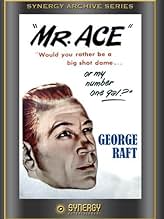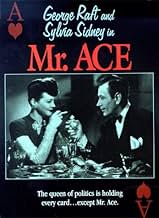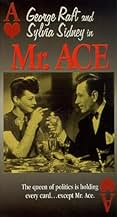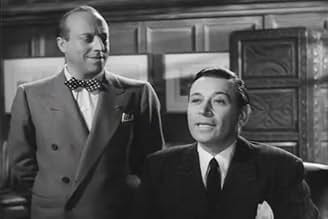Ajouter une intrigue dans votre langueA rich society woman uses a gangster to win a congressional election.A rich society woman uses a gangster to win a congressional election.A rich society woman uses a gangster to win a congressional election.
- Réalisation
- Scénario
- Casting principal
Joyce Bryant
- Nightclub Singer
- (as Joyce Bryant and the Flennoy Trio)
Stanley Andrews
- Tomahawk Club Boss
- (non crédité)
Walter Baldwin
- Bookie - Party Guest
- (non crédité)
Brooks Benedict
- Man Entering Elevator
- (non crédité)
Truman Bradley
- Radio Forum Moderator
- (non crédité)
Gordon B. Clarke
- Nightclub Pianist
- (non crédité)
James Conaty
- Party Guest
- (non crédité)
Lester Dorr
- Reporter at Party
- (non crédité)
Ben Erway
- Tomahawk Club Politico
- (non crédité)
Mary Field
- Lady with Question on Radio Forum
- (non crédité)
Avis à la une
Women in politics weren't common in 1947 when this came out. Therefore, this was a surprisingly straight forward look at the theme with an ambitious socialite who's no sweet "goody goody". I do agree with the reviewer who would have liked more emphasis on Sylvia Sidney and her campaign and less on George Raft and the inevitable romance.
And so this is disappointingly mediocre, not going where it could have gone. Even so, it's an interesting film to watch, especially in this age. And actually, I believe that it stands as a better "woman in politics" movie than most with the theme. Don't expect a gangster movie although Raft naturally is close to being one in this.
And so this is disappointingly mediocre, not going where it could have gone. Even so, it's an interesting film to watch, especially in this age. And actually, I believe that it stands as a better "woman in politics" movie than most with the theme. Don't expect a gangster movie although Raft naturally is close to being one in this.
Congresswoman Sylvia Sidney announces her candidacy for governor, and asks political boss George Raft for his support. He wines her and dimes her and tells her she cannot win, because beautiful women shouldn't be in politics. So she goes to another member of his machine and cuts a deal with him for the nomination in the one-party state.
Miss Sidney's character, named Margaret Wyndham Chase, is clearly modeled on Maine senator Margaret Chase Smith. She even wears the hideous hats that Mrs. Smith affected. The political machine, named the Tomahawk Club, is modeled on New York City's Tammany Hall.
One of the issues I have with Mr.Raft's performances in movies is his impenetrable mien. He says things, and they are things that he believes, it there is rarely any hint of what he is actually thinking. Here that actually works to the performance's benefit; he seems a character who is precise, intelligent and impenetrable. This leaves Miss Sidney to carry the emotional weight of this political romantic comedy.
This was a period during which Hollywood was making movies about practical politics and the effects of the machine. With the end of the Second World War, soldiers were coming home and expected changes. Capra tried a couple of movies, and even John Ford got together his non-western stock company for THE LAST HURRAH. By the time that came out, there were stirrings of change in society and politics, and the movies were no longer part of the National conversation. Nowadays, political movies usually have a sour, satirical edge to them.
Miss Sidney's character, named Margaret Wyndham Chase, is clearly modeled on Maine senator Margaret Chase Smith. She even wears the hideous hats that Mrs. Smith affected. The political machine, named the Tomahawk Club, is modeled on New York City's Tammany Hall.
One of the issues I have with Mr.Raft's performances in movies is his impenetrable mien. He says things, and they are things that he believes, it there is rarely any hint of what he is actually thinking. Here that actually works to the performance's benefit; he seems a character who is precise, intelligent and impenetrable. This leaves Miss Sidney to carry the emotional weight of this political romantic comedy.
This was a period during which Hollywood was making movies about practical politics and the effects of the machine. With the end of the Second World War, soldiers were coming home and expected changes. Capra tried a couple of movies, and even John Ford got together his non-western stock company for THE LAST HURRAH. By the time that came out, there were stirrings of change in society and politics, and the movies were no longer part of the National conversation. Nowadays, political movies usually have a sour, satirical edge to them.
For all its professionalism and excellent music, this is not a very significant film. I actually fell asleep several times during the long gaps of any intrigue leading forward. It becomes interesting not until towards the end, but there is one very interesting character, who actually sustains the whole film: Roman Bohnen as the professor. He raises your interest the moment he first appears, and you look forward to his return throughout the film, which fortunately frequently is repeated. He is the only clever one, while the others are not very convincing. George Raft is always himself as a gangster, and it's impossible to ever like him - his name is enough to deter you from any film he is in. But Sylvia Sidney is even worse - she is probably the least possible convincing actress for a politician.
The twists towards the end save the intrigue and the script, which isn't bad, but the one thing lacking is credibility. They say that all is fair in politicis, but the end proves this wasn't politics at all but merely the old worn-out story of bitter opponents ending up as lovers.
The twists towards the end save the intrigue and the script, which isn't bad, but the one thing lacking is credibility. They say that all is fair in politicis, but the end proves this wasn't politics at all but merely the old worn-out story of bitter opponents ending up as lovers.
This film's makers probably were aiming at a kind of political satire that Capra and Sturges sometimes brought off, but a lack of focus and fear of breaching the production code resulted in a script that lurches one way and then another.
Sylvia Sidney is excellent as a female politician, back when such things were rare, doing her best to conceal her ambition and ruthlessness behind an attractive demeanor with a fixed smile. The script doesn't quite know what to make of her. At first she seems not only wholly self-centered but frigid, having driven her husband, whom she married for his wealth and position, into the arms of other women without her much caring about it. Later she becomes more sympathetic for not being corrupt like most of the other pols around her, and for having to walk a fine line between being ladylike and being "one of the boys."
George Raft is his usual stoic self as a hard-bitten political with hinted-at mob connections whose only ideology is winning and graft (or G. Raft).
Sidney's idea is to lure him away from the machine candidate to back her. In one scene she inveigles him into spending the night at her place with apparent intentions of seducing him, but then the movie gets cold feet and the scene fizzles out, as do many others.
Still the film addresses, albeit timidly, political corruption and the ease with which the masses can be manipulated, and also reminds us of the pervasive sexism of that era. Sidney is repeatedly told "you're too attractive to run for office." Was ugliness considered a necessary attribute of female politicians in those days?
As you'd expect, some romantic sparks eventually fly between the two co-stars en route to its wildly implausible ending.
Good cinematography and some lavish interior decoration. If you're the type who enjoys watching old films for a window into the political atmosphere of their times, this is for you.
Sylvia Sidney is excellent as a female politician, back when such things were rare, doing her best to conceal her ambition and ruthlessness behind an attractive demeanor with a fixed smile. The script doesn't quite know what to make of her. At first she seems not only wholly self-centered but frigid, having driven her husband, whom she married for his wealth and position, into the arms of other women without her much caring about it. Later she becomes more sympathetic for not being corrupt like most of the other pols around her, and for having to walk a fine line between being ladylike and being "one of the boys."
George Raft is his usual stoic self as a hard-bitten political with hinted-at mob connections whose only ideology is winning and graft (or G. Raft).
Sidney's idea is to lure him away from the machine candidate to back her. In one scene she inveigles him into spending the night at her place with apparent intentions of seducing him, but then the movie gets cold feet and the scene fizzles out, as do many others.
Still the film addresses, albeit timidly, political corruption and the ease with which the masses can be manipulated, and also reminds us of the pervasive sexism of that era. Sidney is repeatedly told "you're too attractive to run for office." Was ugliness considered a necessary attribute of female politicians in those days?
As you'd expect, some romantic sparks eventually fly between the two co-stars en route to its wildly implausible ending.
Good cinematography and some lavish interior decoration. If you're the type who enjoys watching old films for a window into the political atmosphere of their times, this is for you.
Interesting political film from 1946 with the always excellent Sylvia Sidney. Particulary liked the scene where she discusses politics ( interupted by a phone call from her ex husband ) while having a massage. Worth a look.
Le saviez-vous
- Anecdotes"The Hedda Hopper Show - This Is Hollywood" broadcast a 30 minute radio adaptation of the movie on January 25, 1947 with George Raft and Sylvia Sidney reprising their film roles.
- Citations
Margaret Wyndham Chase: You'll make a very impressive governor's husband, darling.
Meilleurs choix
Connectez-vous pour évaluer et suivre la liste de favoris afin de recevoir des recommandations personnalisées
Détails
- Durée1 heure 24 minutes
- Couleur
- Rapport de forme
- 1.37 : 1
Contribuer à cette page
Suggérer une modification ou ajouter du contenu manquant






































